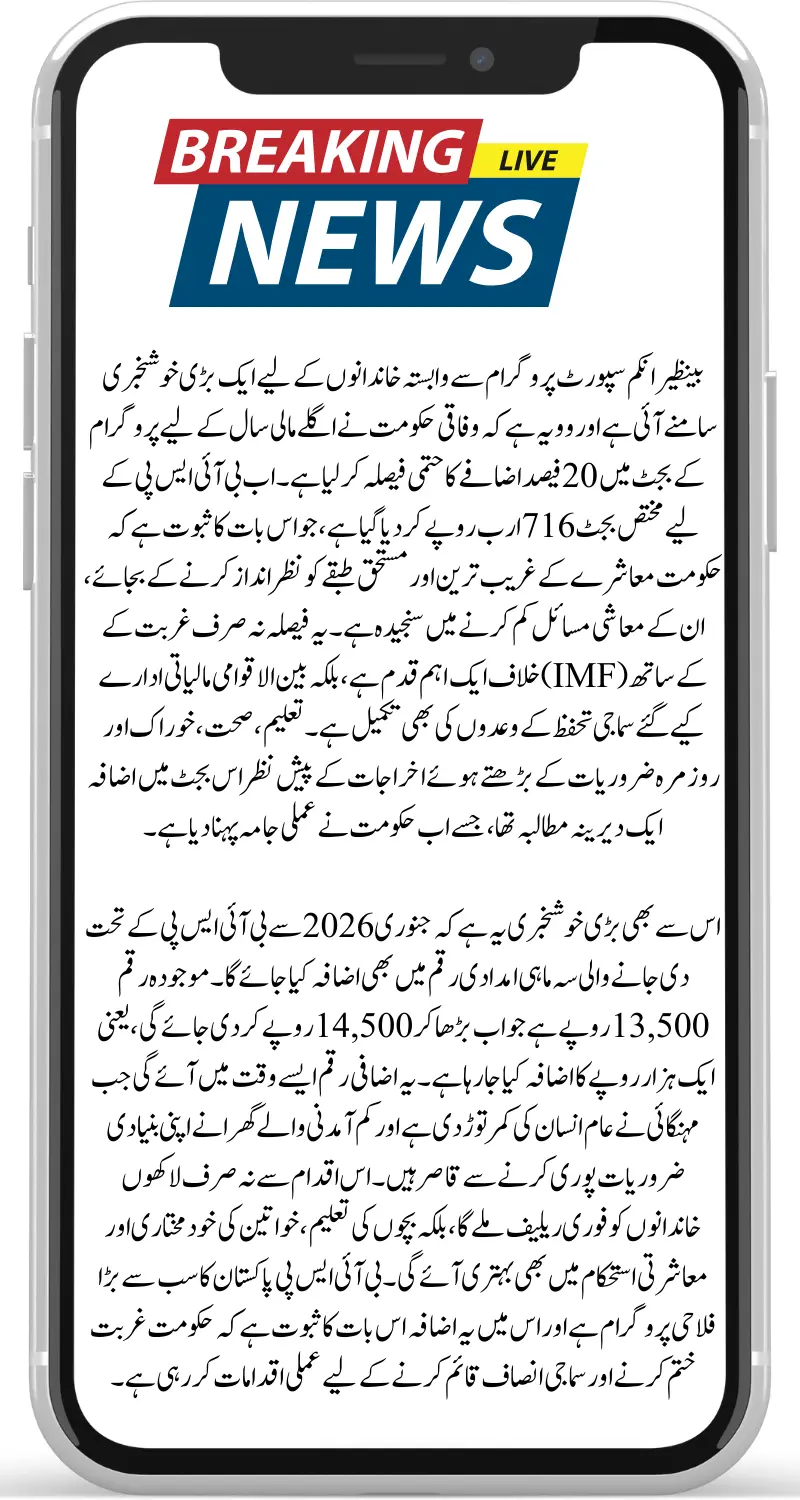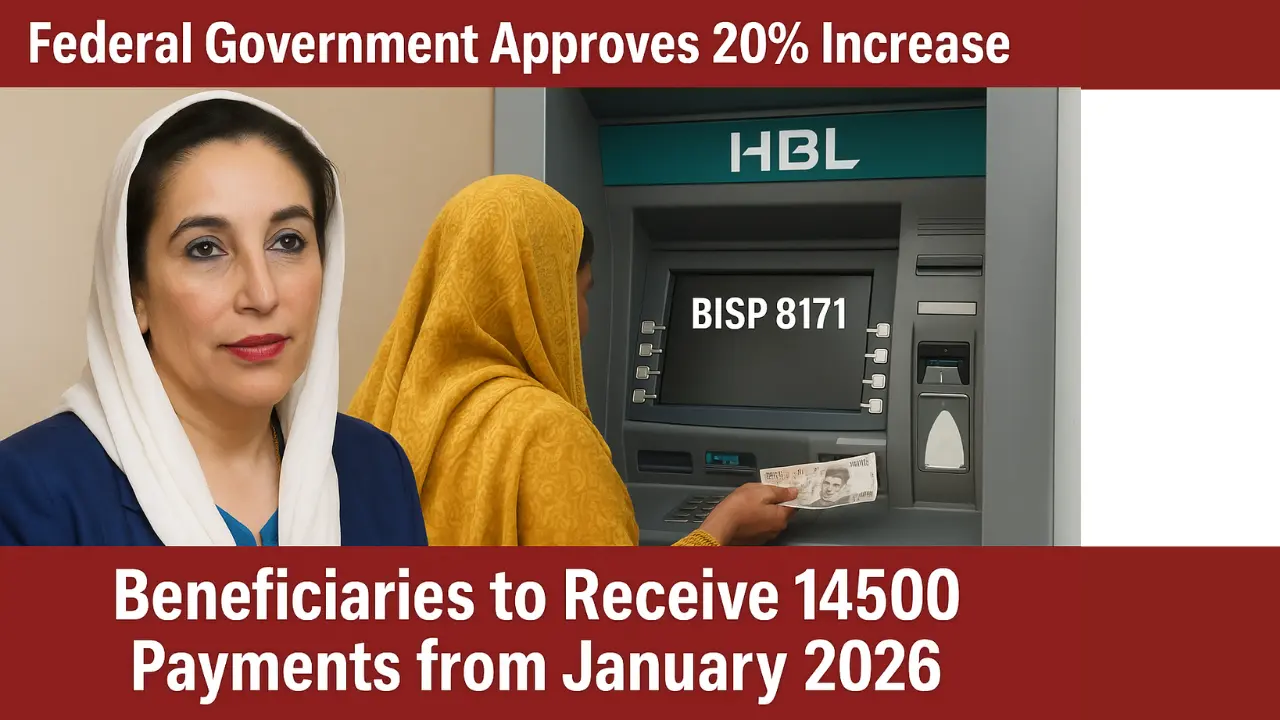BISP 8171 Program
There is great good news for families affiliated with the Benazir Income Support Program (BISP 8171). That is the federal government has taken a final decision to increase the BISP 8171 Program budget by 20 percent for the next fiscal year. Now the budget allocated for BISP has been increased to Rs 716 billion, which is proof that the government is serious about alleviating the economic problems of the poorest and most deserving sections of society, instead of neglecting them. This decision is not only an important step against poverty, but also a fulfillment of the social security promises made to the International Monetary Fund (IMF). In view of the increasing costs of education, health, food and daily necessities, this increase in the budget was a long-standing demand, which has now been implemented by the government.
Even greater good news is that the quarterly assistance amount given under BISP will also be increased from January 2026. The current amount is Rs 13,500 which will now be increased to Rs 14,500, i.e. an increase of Rs 1,000. This additional amount will come at a time when inflation has broken the back of the common man and low-income families are unable to meet their basic needs. This measure will not only provide immediate relief to millions of families, but will also improve children’s education, women’s empowerment and social stability. BISP is Pakistan’s largest welfare program and this increase is proof that the government is taking practical steps to eradicate poverty and establish social justice.
You Can Also Read: Punjab AZAG Balloting Results Announcement Check Your 3 Marla Plot status online through CNIC

What Is Benazir Income Support Programme (BISP)?
The Benazir Income Support Programme (BISP) is the largest social protection initiative of the Government of Pakistan, launched in 2008 with the goal of reducing poverty and providing financial relief to the country’s most vulnerable citizens. Named after the late Prime Minister Benazir Bhutto, the program was designed to extend direct cash assistance to low-income families, with a special focus on women empowerment. Under BISP, eligible women from poor households receive quarterly payments to help them meet essential needs like food, healthcare, and education expenses. The program is primarily female-centric, with the payment made in the name of the woman of the household to ensure greater financial inclusion and empowerment.
Over time, BISP has expanded its services by launching several sub-programs, including the Kafalat Program (quarterly unconditional cash transfers), Taleemi Wazaif (educational stipends for children), and Nashonuma (nutrition support for pregnant women and young children). Beneficiaries are identified through the National Socio-Economic Registry (NSER), which collects data through dynamic surveys to ensure transparency and accurate targeting. The BISP payment system has also been modernized to include bank transfers, mobile wallets, and ATM access. With millions of families benefiting from this program across Pakistan, BISP plays a crucial role in uplifting poor communities, reducing inequality, and supporting long-term human development in the country.
You Can Also Read: Punjab Kisan Card Loan Limit Increased to Rs 3 Lakh – Tractors, Solar Tube Well Subsidy & More Announced
Features Of Benazir Income Support 8171 Program
| Feature | Details |
| Program Name | Benazir Income Support Programme (BISP) |
| New Budget Allocation | Rs. 716 Billion |
| Budget Increase | 20% more than current fiscal year |
| New Quarterly Stipend (from Jan 2026) | Rs. 14,500 |
| Current Quarterly Stipend | Rs. 13,500 |
| Implementation Timeline | From January 2026 |
| Target Beneficiaries | Millions of low-income families |
| Reform Partner | International Monetary Fund (IMF) |
BISP Budget Raised to Rs. 716 Billion for Next Fiscal Year
The Government of Pakistan has officially informed the International Monetary Fund (IMF) about its decision to enhance BISP’s budget to a record Rs. 716 billion for the upcoming financial year. This budget allocation represents a historic commitment to social protection in the country and highlights the state’s intent to strengthen the economic safety net for its most vulnerable citizens.
BISP is not just a welfare initiative; it has become a symbol of Pakistan’s commitment to poverty alleviation, especially for women-led households. This budget hike demonstrates the government’s resolve to scale up assistance and deliver impactful programs that address ground realities.
20% Increase Compared to the Current Fiscal Year
This year’s 20% increase marks one of the most significant hikes in BISP’s history. It reflects the urgency to combat soaring inflation, unemployment, and food insecurity affecting millions of Pakistanis. The budgetary increase also fulfills part of the government’s broader IMF-backed social reform commitments, ensuring that international financial support is aligned with meaningful relief for the masses.
Such an increase will allow the program to expand its coverage and provide larger payments to more families in need, particularly in rural and underserved regions.
BISP Stipend Increase Announced: Rs. 14,500 from January 2026
One of the key updates announced with the new budget is the increment in quarterly stipends for BISP beneficiaries. From January 2026, the current Rs. 13,500 quarterly cash assistance will be increased to Rs. 14,500, adding an extra Rs. 1,000 per payment cycle for eligible families.
This increase will directly benefit millions of low-income households across Pakistan. The additional financial support is expected to assist families in managing rising costs of essential goods, particularly food, fuel, and education-related expenses for children.
Eligibility Criteria
- Must be a low-income family (assessed via PMT score).
- Must complete the NSER (National Socio-Economic Registry) survey.
- Preference given to widows, divorced women, disabled persons, and families without regular income.
Why the Budget Increase Was Necessary
The decision to expand the BISP budget comes at a time when over 40% of the population lives below the poverty line, and economic pressures are mounting for many households. The rise in poverty and food insecurity has made it critical for the government to enhance its social safety nets.
BISP not only provides direct financial support but also ensures educational stipends through the Taleemi Wazaif program, nutrition support through Nashonuma, and empowerment of women through unconditional cash transfers. This expansion is essential to ensure that children continue their education, women gain financial independence, and poor families receive enough to maintain basic nutrition and dignity.
You Can Also Read: Punjab CM Approves Wheat Support Price for 6 Lakh Farmers via Kisan Card – Get Rs. 5,000 Per Acre Now
Conclusion
This good decision to increase the BISP budget and quarterly payments reflects the government’s long-term commitment to social justice and economic resilience. It is a recognition that Pakistan’s journey toward stability must include its most vulnerable citizens at the center of national policy.
With this increase, BISP continues to serve as Pakistan’s flagship poverty alleviation initiative, providing hope, dignity, and opportunity to those who need it most. As the government works to implement reforms under IMF guidance, this investment in social protection could pave the way for a more equitable and stable future for all Pakistanis.

